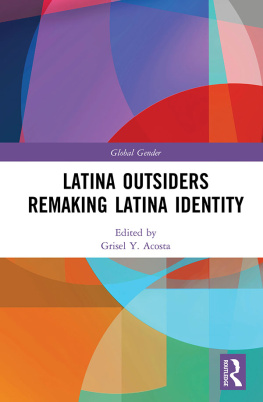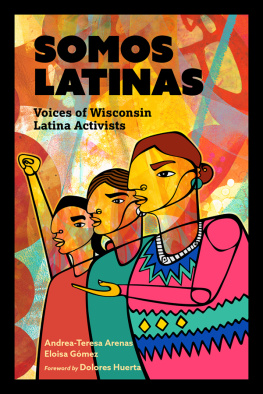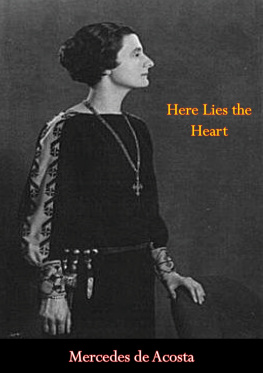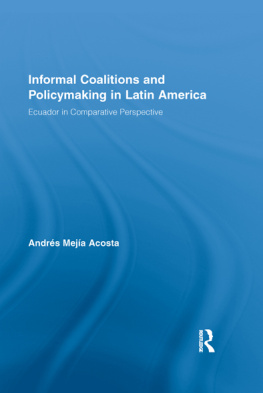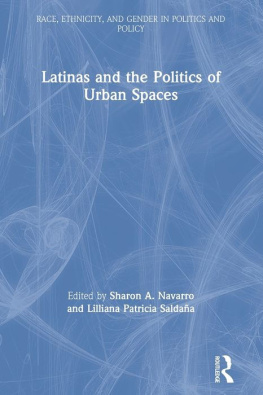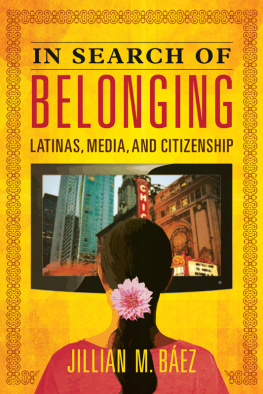AMIGAS Y AMANTES
Families in Focus
Series Editors
Anita Ilta Garey, University of Connecticut
Naomi R. Gerstel, University of Massachusetts, Amherst
Karen V. Hansen, Brandeis University
Rosanna Hertz, Wellesley College
Margaret K. Nelson, Middlebury College
Katie L. Acosta, Amigas y Amantes: Sexually Nonconforming Latinas Negotiate Family
Anita Ilta Garey and Karen V. Hansen, eds., At the Heart of Work and Family: Engaging the Ideas of Arlie Hochschild
Mary Ann Mason, Nicholas H. Wolfinger, and Marc Goulden, Do Babies Matter? Gender and Family in the Ivory Tower
Jamie L. Mullaney and Janet Hinson Shope, Paid to Party: Working Time and Emotion in Direct Home Sales
Markella B. Rutherford, Adult Supervision Required: Private Freedom and Public Constraints for Parents and Children
Barbara Wells, Daughters and Granddaughters of Farmworkers: Emerging from the Long Shadow of Farm Labor
AMIGAS Y AMANTES
Sexually Nonconforming Latinas Negotiate Family
K ATIE L. A COSTA
RUTGERS UNIVERSITY PRESS
NEW BRUNSWICK, NEW JERSEY, AND LONDON
Library of Congress Cataloging-in-Publication Data
Acosta, Katie L., 1980
Amigas y amantes : sexually nonconforming Latinas negotiate family / Katie L. Acosta.
pages cm. (Families in focus)
Includes .
ISBN 9780813561967 (hardcover : alk. paper) ISBN 9780813561950 (pbk. : alk. paper) ISBN 9780813561974 (e-book)
1. Lesbian mothers. 2. Hispanic American lesbians. I. Title.
HQ75.53.A28 2013
306.874'308664dc232013000430
A British Cataloging-in-Publication record for this book is available from the British Library.
Excerpts from my article The Language of (In)Visibility: Using In-Between Spaces as a Vehicle for Empowerment in the Family, Journal of Homosexuality 58, nos. 67 (2011): 883900, reprinted by permission of the publisher, Taylor & Francis Ltd., http://www.tandf.co.uk/journals.
Copyright 2013 by Katie L. Acosta
All rights reserved
No part of this book may be reproduced or utilized in any form or by any means, electronic or mechanical, or by any information storage and retrieval system, without written permission from the publisher. Please contact Rutgers University Press, 106 Somerset Street, New Brunswick, NJ 08901. The only exception to this prohibition is fair use as defined by U.S. copyright law.
Visit our website: http://rutgerspress.rutgers.edu
Manufactured in the United States of America
For Josiah and Camila,
with hopes of a more accepting world for you both
CONTENTS
I came to the study of Latina/o sexualities at the most opportune time. I was a graduate student at the University of Connecticut and one of my mentors, Marysol Asencio, had just received a Ford Foundation grant to map the nascent field of Latina/o sexualities. She hired me as her research assistant on this project, which involved the bringing together of all of the top scholars in the area to discuss the advancements which had been made and to identify the multitude of work left to be done. That project culminated in a much awaited anthology, Latina/o Sexualities: Probing Powers, Passions, Practices, and Policies. Over the course of working on this project, I received an unprecedented amount of support from everyone involved. Unlike many sexualities scholars in the academy, I never felt marginalized. On the contrary, from the beginning I felt as if I were becoming part of a vibrant and growing community of researchers whom I respected and who were rooting for my success. I am very grateful to Marysol Asencio for giving me the invaluable opportunity to be part of such a collective and to all of the members of the Latina/o sexualities board for their enthusiasm for my work. This experience gave me the confidence I needed to write Amigas y Amantes.
I also need to thank Nancy Naples, Bandana Purkayastha, and Carlos Decena for extending their relentless loyalty and support to me while I was a student and in the following years as I wrote this book. Im indebted to Nancy for helping me see the hidden potential in my data and for continuing to advise me during the writing of this book until the very end. I am thankful as well for Bandana, who has always kept me grounded with sound professional advice about my career goals, and for Carlos for all of his feedback on chapters and for the many conversations weve had over the years, all of which have helped me grow exponentially as a scholar. Thank you all for caring about me as a person in addition to caring about me as a student and later a colleague, always recognizing how my personal needs shaped my research.
During the data collection process, many key figures and organizations at the University of Connecticut supported my efforts. I extend a special thanks to the Puerto Rican/Latino Studies program for funding me during my years as a graduate student. In particular, I thank Anne Theriault for her instrumental role in soliciting funds for me to attend conferences to present my preliminary research findings. The Rainbow Center at the University of Connecticut supported me by creating a welcoming space in which I could discuss my ideas. I also benefited from the University of Connecticuts Multicultural Fellowship, which I received for the duration of my time in graduate school.
When I set out to write Amigas y Amantes, I had a strong sense that this work had a mind of its own. I imagined Amigas y Amantes as a living being with its own agenda and myself as the surrogate entrusted to carry out the mission. This feeling came from the myriad people who, both silently and audibly, were pushing and longing for its creation and existence. In addition to my colleagues, who shared my excitement for this project, were the study participants who themselves wanted to have their stories told. This book would not have come to fruition without the overwhelming support I received from my respondents, who opened their lives to me in such intimate and uninhibited ways: all of the times they included me in their events and the innumerable times they shared their fears, joys, frustrations, and triumphs. It is by no means an easy task to share so much of oneself in the ways in which the participants in this study opened themselves and their lives and stories to me, and I remain overwhelmed and indebted to them for doing so with such bravery and candor. I also thank the participants for the ways in which they have helped shape me as a person over the years. In the academy, we rightfully spend much time exploring how the researcher can change the participants, alter their environments, or potentially cause them harm. However, while I hope I have benefited my participants by yielding a voice to their too often silenced stories, my experience has been that I, too, have grown, changed, and evolved over the years on account of my involvement in the LBQ (lesbian, bisexual, and queer) communities where I conducted this research. Thank you all for holding me accountable, assisting me in my journey by sharing yours, and helping me grow by including me in your lives. I hope to have done justice to the complexities, the beauty, the pain, the joy, and the individuality and communality of your experiences in these pages.


